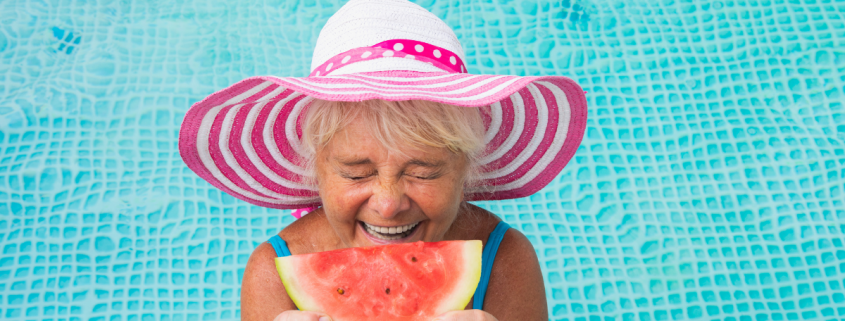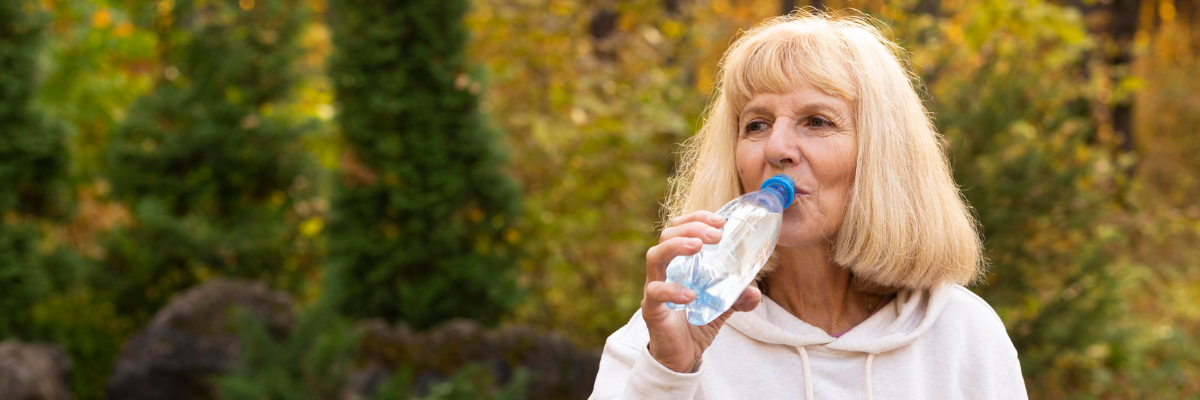Summer Safety Tips for Senior Care: How To Stay Cool in Summer
High temperatures and scorching sun are a challenge to anyone. Yet for seniors, such weather conditions can pose a particular threat to their health or even their lives. That is why it is important to know how to prepare for hot days and what to do once the summer heat has settled in for good. Learn important tips to help your senior bear the heat much easier and avoid the dangerous consequences of overheating in elderly care.
What do you need to know about the risks to seniors during hot weather in elderly care?
The mortality rate in the age group between 70 and 80 during the hot summer is almost twice as high as at other times of the year. Why? As the years go by, our defence mechanism against heat, namely sweating and breathing, becomes less and less efficient. This is a direct consequence of the decline in the efficiency of our respiratory system, a weaker heart, and the atrophy of the sweat glands, which happens with time. Hence, when it gets really hot outside the window, the senior body needs protection and support. For people over sixty, the summer heat should be a warning signal.
What are the risks for seniors during hot weather?
As a senior care provider, you should know the basic dangers of hot weather for seniors. These possibilities are something every elderly care provider needs to know:
Dehydration
Body dehydration can be very dangerous for seniors, so as an elderly care provider, you should know its symptoms. It manifests itself as decreased kidney function, fatigue, headache and dizziness, nausea, fever, tinnitus, seizures, increased body temperature, and increased heart and breathing rate.
Heat stroke
A second risk that every senior care provider must be aware of is heat stroke or overheating of the body, which can cause unconsciousness or even loss of life. Typical symptoms of heat stroke include exhaustion, feeling of heat, disorientation, red and dry skin, thirst, tinnitus in the ears and temples, dark circles below the eyes, dizziness, and headache, sometimes also nausea and vomiting, body temperature exceeding even 38 degrees.
What temperature is dangerous for the elderly?
Wondering what temperature is dangerous for the elderly? Overall, temperatures outside over 40˚C are considered dangerous for all adults, with temperatures over 50˚C conducive to the onset of heat stroke. For older people, temperatures already exceeding 30˚C pose a high risk of dehydration.
What is the ideal room temperature for the elderly?
As a senior care provider, you should also remember the importance of room temperature. An elderly person sitting in a cool flat and then going out into the 30-degree heat can easily become ill. What is the ideal room temperature for the elderly? In general, it should not be more than 10 degrees lower than the temperature outside.
Does hot weather raise blood pressure?
Wondering if the outside temperature affects your body temperature when you are outside during hot weather? Yes, hot weather can have this effect. The average normal body temperature should be around 37 °C, but this can vary from person to person, and during hot weather, it rises, and with it, your blood pressure can rise.
How to stay cool in summer?
Here are the essentials to keep in mind as a senior care provider.
Be sure to keep a senior properly hydrated
In hot weather, regular drinking of adequate amounts of water is an essential way how to stay cool in summer. How much water should a senior citizen drink in hot weather? An adult should consume 2 to 3 litres of drinks on hot days. It is important that the fluids are administered in small doses, but often and regularly. Apart from water, we recommend cool fruit teas without sugar, natural fruit juices diluted with water and electrolyte preparations dedicated to the elderly. As a senior care provider, remember to hydrate your senior’s body as you can save their life.
Wear appropriate clothing
If you leave the house on a hot summer day with your senior, it is essential to wear a hat. A light cotton baseball cap and a linen or straw hat will effectively protect your head from the heat and the sun. What clothes should seniors choose in hot weather? First of all, light, loose and airy, necessarily made of natural fabrics, such as linen. On the other hand, artificial materials should be avoided. Such materials do not let the air through and impair our body’s natural cooling system.
Use UV sunscreen
Unless it’s necessary, seniors are advised not to leave the house during hot weather and to be outside between 10 a.m. and 5 p.m. This is the time when the sun shines most intensely. However, if you do decide to go out with your senior, be sure to protect exposed skin with creams with high UV filters, as seniors’ thin skin is more prone to irritation and sunburn.
That’s all our advice for the elderly and senior care providers to survive the summer. We hope you found this article helpful and invite you to read the others available on our blog.















